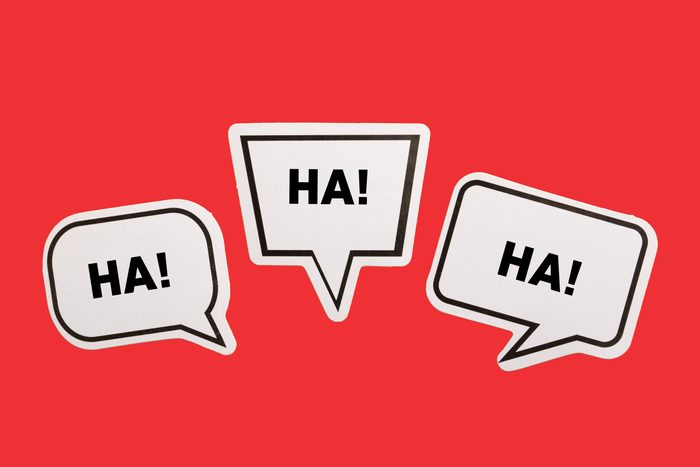
Figurative or literary phrases
The English language, chock-full of thousands of words and quirky borrowed phrases, can be mind-boggling. Take idioms, for instance. These common figurative or literary phrases don’t make much sense at face value. But you use idioms all the time—so often that you might not realize you’re weaving them into your conversations at all. According to the Common Core State Standards Initiative, schoolchildren in the United States start learning these expressions in fourth grade.
While it’s impossible to tally up the idioms spoken aloud each day, linguists and word nerds at theidioms.com have put together a list of the most common idioms in English-speaking countries. Ready? Let’s comb through them then check out the 30 British phrases that always confuse Americans.

Piece of cake
What could possibly be easier to tackle than a piece of cake? A “piece of cake” is something that’s so deliciously easy you could do it with your eyes closed. Remember not to mix up this idiom by getting carried away with all the sweet talk. Referring to your to-do list as a “pinch of cake” or “peach of cake” might make you look like you’re not the sharpest tool in the shed. You’ll also want to avoid these 70 words and phrases most people use all wrong.

A hot potato
Before heading to the supper table at the next family reunion, you might want to make a note to avoid hot potato political talk. In other words, avoid awkward or controversial topics. According to CulinaryLore.com, this 1800s idiom has a simple explanation: Since baked potatoes remain scorching inside long after they’ve been removed from the heat, “people are always very cautious when handling them.” These are the slang words no one from your state will understand.
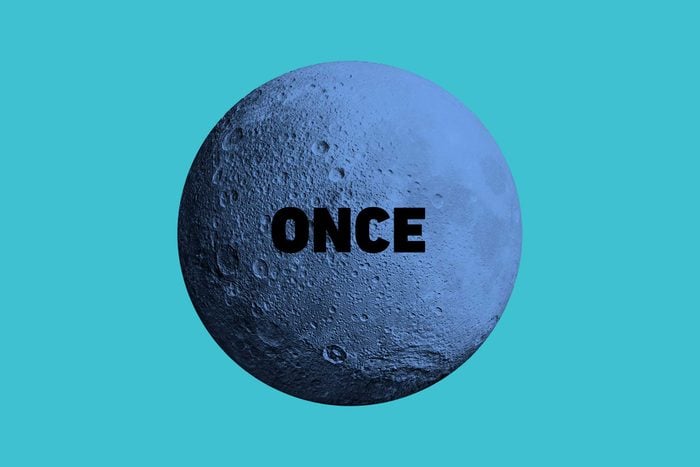
Once in a blue moon
When someone says something happens “once in a blue moon,” you know that whatever they’re talking about is a rare occurrence. For example: “When does your eccentric aunt who lives in a log cabin on a mountain come to visit?” “Oh, once in a blue moon.” Believe it or not, blue moons are real astronomical phenomenons, albeit rare ones. A blue moon is the second full moon appearing in one month, and it only occurs once every 2.7 years. Most blue moons still look white, gray, or yellow. Once in a very long while, according to NASA, smoke from forest fires or other environmental factors do give the moon a slightly blue tinge.
Psst! Learn about the origin of the phrase “for Pete’s sake”.

Bed of roses
Often used as an intro to idioms in elementary school classrooms, “a bed of roses” takes the cake as one of the easiest figurative phrases to decipher. Let’s use it in a sentence: “The queen’s life is a bed of roses compared to her servant’s.” Part of this idiom’s fun is that it is can also be used to highlight a negative situation. For instance, “Learning a new language isn’t always a bed of roses.” Discover the origins of 14 common idioms you use all the time.
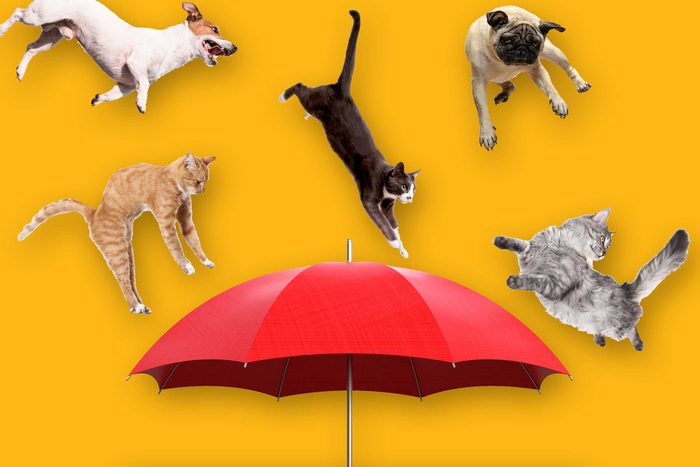
Raining cats and dogs
Close your eyes and imagine the loudest thunderstorm you’ve ever experienced. Does the wind sound like a whining cat? Does the thunder boom like the bark of a giant beast? Perhaps it seems like it’s raining cats and dogs. According to the Library of Congress, the origin of “raining cats and dogs” is still unclear. It’s an ancient idiom that could be rooted in “Norse mythology, medieval superstitions… or dead animals in the streets of Britain being picked up by storm waters.” You might be familiar with a legend that says cats and dogs once fell from their perches on thatched roofs during storms. However, this has been shrugged off as a ridiculous tale. What we do know is that animal-related idioms, from “the dog days of summer” to “cat got your tongue,” are just plain fun to weave into daily dialogue.
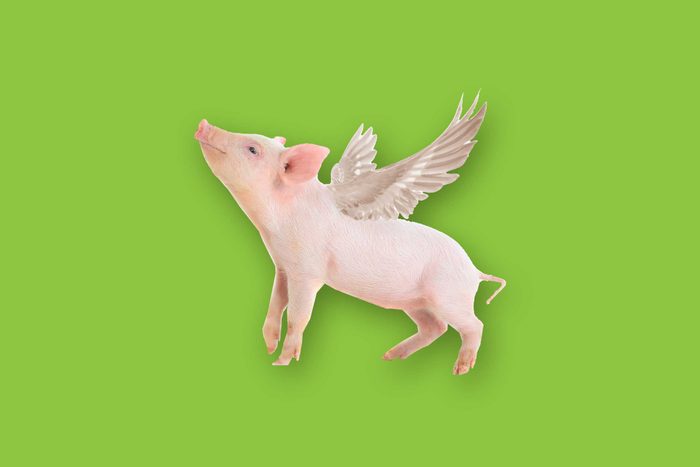
When pigs fly
Imagine a potbelly pig languishing in the mud on a sweltering summer day. That pig is as likely to sprout wings and fly as you are to wring blood from a stone. It just can’t be done! Pigs don’t fly. Hell won’t freeze over. And the sky won’t fall. All these idioms refer to something impossible or highly unlikely. Check out these examples of hyperbole.

Devil’s advocate
According to Merriam-Webster, a devil’s advocate is the “person who champions the less accepted cause for the sake of argument.” That time you argued that we could all learn about dinosaurs from Jurassic Park (one of the most scientifically inaccurate movies of all time)? You were definitely playing devil’s advocate. Sometimes being the devil’s advocate in a debate is fun, but it can be lonely if you know you’re the only one who sees things the way you do.

Miss the boat
According to the Bloomsbury International School in London, warning others not to “miss the boat” can be traced back to the early 1900s, when passenger boat travel became more mainstream. Initially, of course, it was a simple instruction not to miss a literal sea vessel. But over time, sailors started using the phrase to describe all missed opportunities. Didn’t get to supper before the food was gone? You missed the boat. Forgot to submit an application to your dream job before the deadline? You missed the boat. Find out 22 words and phrases you had no idea originated in the military.

Apple of the eye
Every little baby in the world is the apple of their grandparents’ eyes. The phrase describes someone loved beyond all compare, held above all others around. Sometimes it’s used to describe pets or valuable keepsakes, but “apple of the eye” usually refers to a person. This idiom is one of the oldest, dating back more than 1,000 years. Grammarist.com says the eye’s apple is actually an outdated anatomical term. For years, the “apple of the eye” referred to the pupil, the dark center of your eye. It makes sense that something kept so close and central—and also something that helps us see our loved ones —became a reference for a treasured item. We still don’t know exactly how and when the phrase evolved into what it is today, but it remains one of the most popular idioms of the English language. These 11 old insults have turned into modern-day compliments.

Zip your lips
When you’ve gotten a little too chatty or spilled someone else’s secret, it’s way past time to zip your lips. Translation: be quiet, stop talking, and don’t say a word! The idiom has even been altered into an emoji, the yellow face with a literal zipper as its mouth. Emojipedia.org reports that the zipper-mouthed face, which was added to most phones in 2015, means “my lips are sealed.” Find out the real meaning behind 11 of the most cryptic emojis.

Blessing in disguise
In an out-of-print reference book called Cliches: Over 1500 Phrases Explored and Explained, linguist Betty Kirkpatrick said that “blessing in disguise” was first printed in the 18th century by a poet named James Hervey. He wrote, “E’en crosses from his sov’reign hand are blessings in disguise.” In other words, Hervey believed that the cross, an instrument for the death penalty, was simply a disguised blessing. Today, you probably don’t often refer to violent death as a blessing in disguise. But think about when a rain cloud has a silver lining. Or consider how sometimes one door closes so another can open. Those are blessings in disguise.

Under the weather
According to Harvest.net, an English language school, “under the weather” is one of the most frequently used idioms in the United States. Hopefully, the usage reflects our witty conversational skills rather than our sickness rates. Being under the weather describes someone down for the count with a cold or other minor illness. It’s not correct to say someone with a terminal disease is “under the weather,” for instance. Part of this has to do with the phrase’s origin, which we can trace back to the sailors of old. Farmers’ Almanac reveals that travelers prone to seasickness would go below deck during a storm to literally hide “under the weather.” The idiom gradually took hold as an indicator of short-term sickness. Work these 18 Latin phrases into conversations to instantly sound smarter.
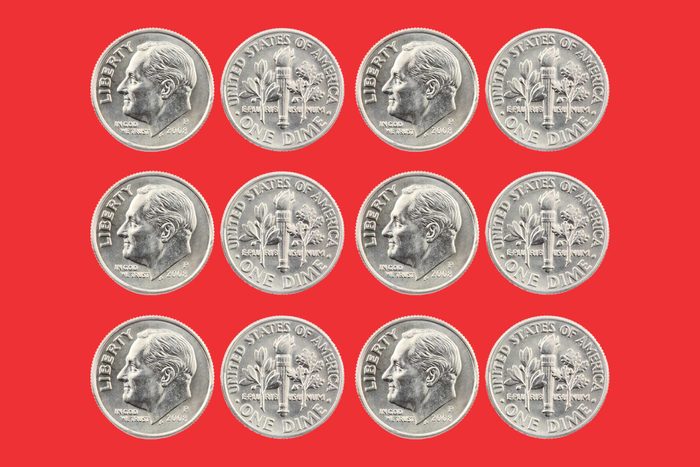
A dime a dozen
Idioms are a dime a dozen these days, but that doesn’t mean they aren’t useful. “A dime a dozen” dates back several generations to the late 1800s and early 1900s when it was possible to buy fruit or eggs for a dime a dozen. According to macmillondictionary.com, the saying refers to a collection of items that are common and not very valuable. Though the price of eggs and produce has gone up over the years, the phrase has stuck around. Next, read on to learn 11 international idioms that sound hilarious in English.
